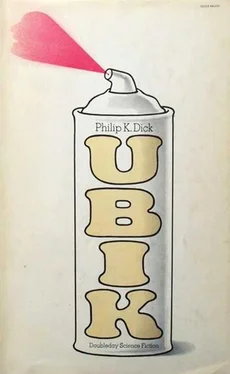He reached the casket, hesitated, then looked down.
A singed, dehydrated heap of bones lay at one end of the casket, culminating in a paper-like skull that leered up at him, the eyes recessed like dried grapes. Tatters of cloth with bristle-like woven spines had collected near the tiny body, as if blown there by wind. As if the body, breathing, had cluttered itself with them by its wheezing, meager processes—inhalation and exhalation which had now ceased. Nothing stirred. The mysterious change, which had also degraded Wendy Wright and Al, had reached its end, evidently a long time ago. Years ago, he thought, remembering Wendy.
Had the others in the group seen this? Or had it happened since the services? Joe reached out, took hold of the oak lid of the casket and shut it; the thump of wood against wood echoed throughout the empty mortuary, but no one heard it. No one appeared.
Blinded by tears of fright, he made his way back out of the dust-stricken, silent room. Back into the weak sunlight of late afternoon.
“What’s the matter?” Don Denny asked him as he rejoined the group.
Joe said, “Nothing.”
“You look scared out of your goony wits,” Pat Conley said acutely.
“Nothing!” He stared at her with deep, infuriated hostility.
Tippy Jackson said to him, “While you were in there did you by any chance happen to see Edie Dorn?”
“She’s missing,” Jon Ild said by way of explanation.
“But she was just out here,” Joe protested.
“All day she’s been saying she felt terribly cold and tired,” Don Denny said. “It may be that she went back to the hotel; she said something about it earlier, that she wanted to lie down and take a nap right after the services, She’s probably all right.”
Joe said, “She’s probably dead.” To all of them he said, “I thought you understood. If any one of us gets separated from the group he won’t survive; what happened to Wendy and Al and Runciter—” He broke off.
“Runciter was killed in the blast,” Don Denny said.
“We were all killed in the blast,” Joe said. “I know that because Runciter told me; he wrote it on the wall of the men’s room back at our New York offices. And I saw it again on—”
“What you’re saying is insane,” Pat Conley said sharply, interrupting him. “Is Runciter dead or isn’t he? Are we dead or aren’t we? First you say one thing, then you say another. Can’t you be consistent?”
“Try to be consistent,” Jon Ild put in. The others, their faces pinched and creased with worry, nodded in mute agreement.
Joe said, “I can tell you what the graffiti said, I can tell you about the worn-out tape recorder, the instructions that came with it; I can tell you about Runciter’s TV commercial, the note in the carton of cigarettes in Baltimore—I can tell you about the label on the flask of Elixir of Ubique. But I can’t make it all add up. In any case, we have to get to your hotel to try to reach Edie Dorn before she withers away and irreversibly expires. Where can we get a taxi?”
“The mortuary has provided us with a car to use while we’re here,” Don Denny said. “That Pierce-Arrow sitting over there.” He pointed.
They hurried toward it.
“We’re not all of us going to be able to fit in,” Tippy Jackson said as Don Denny tugged the solid iron door open and got inside.
“Ask Bliss if we can take the Willys-Knight,” Joe said; he started up the engine of the Pierce-Arrow and, as soon as everyone possible had gotten into the car, drove out onto the busy main street of Des Moines. The Willys-Knight followed close behind, its horn honking dolefully to tell Joe it was there.
Pop tasty Ubik into your toaster, made only from fresh fruit and healthful all-vegetable shortening. Ubik makes breakfast a feast, puts zing into your thing! Safe when handled as directed.
One by one, Joe Chip said to himself as he piloted the big car through traffic, we’re succumbing. Something is wrong with my theory. Edie, by being with the group, should have been immune. And I—
It should have been me, he thought. Sometime during my slow flight from New York.
“What we’ll have to do,” he said to Don Denny, “is make sure that anyone who feels tired—that seems to be the first warning—tells the rest of us. And isn’t allowed to wander away.”
Twisting around to face those in the back seat, Don said, “Do you all hear that? As soon as any of you feels tired, even a little bit, report it to either Mr. Chip or myself.” He turned back toward Joe. “And then what?” he asked.
“And then what, Joe?” Pat Conley echoed. “What do we do then? Tell us how we do it, Joe. We’re listening.”
Joe said to her, “It seems strange to me that your talent isn’t coming into play. This situation appears to me to be made for it. Why can’t you go back fifteen minutes and compel Edie Dorn not to wander off? Do what you did when I first introduced you to Runciter.”
“G. G. Ashwood introduced me to Mr. Runciter,” Pat said.
“So you’re not going to do anything,” Joe said.
Sammy Mundo giggled and said, “They had a fight last night while we were eating dinner, Miss Conley and Miss Dorn. Miss Conley doesn’t like her; that’s why she won’t help.”
“I liked Edie,” Pat said.
“Do you have any reason for not making use of your talent?” Don Denny asked her. “Joe’s right; it’s very strange and difficult to understand—at least for me—why exactly you don’t try to help.”
After a pause Pat said, “My talent doesn’t work any more. It hasn’t since the bomb blast on Luna.”
“Why didn’t you say so?” Joe said.
Pat said, “I didn’t feel like saying so, goddam it. Why should I volunteer information like that, that I can’t do anything? I keep trying and it keeps not working; nothing happens. And it’s never been that way before. I’ve had the talent virtually my entire life.”
“When did—” Joe began.
“With Runciter,” Pat said. “On Luna, right away. Before you asked me.”
“So you knew that long ago,” Joe said.
“I tried again in New York, after you showed up from Zurich and it was obvious that something awful had happened to Wendy. And I’ve been trying now; I started as soon as you said Edie was probably dead. Maybe it’s because we’re back in this archaic time period; maybe psionic talents don’t work in 1939. But that wouldn’t explain Luna. Unless we had already traveled back here and we didn’t realize it.” She lapsed into brooding, introverted silence; dully, she gazed out at the streets of Des Moines, a bitter expression on her potent, wild face.
It fits in, Joe said to himself. Of course, her time-traveling talent no longer functions. This is not really 1939, and we are outside of time entirely; this proves that Al was right. The graffiti was right. This is half-life, as the couplets told us.
He did not, however, say this to the others with him in the car. Why tell them it’s hopeless? he said to himself. They’re going to find it out soon enough. The smarter ones, such as Denny, probably understand it already. Based on what I’ve said and what they themselves have gone through.
“This really bothers you,” Don Denny said to him, “that her talent no longer works.”
“Sure.” He nodded. “I hoped it might change the situation.”
“There’s more,” Denny said with acute intuition. “I can tell by your”—he gestured—“tone of voice, maybe. Anyhow, I know. This means something. It’s important. It tells you something.”
“Do I keep going straight here?” Joe said, slowing the Pierce-Arrow at an intersection.
Читать дальше








